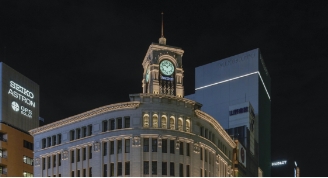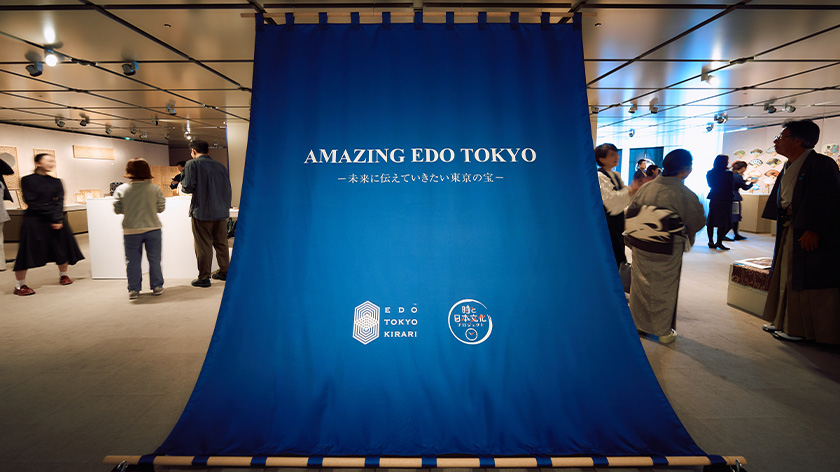- HOME
- Sustainability
- Time and Japanese Culture Project
- The Art of Time as woven by performers and artisans: Ten full-length costumes depicting the four seasons, presented by Tamasaburo Bando
The Art of Time as woven by performers and artisans: Ten full-length costumes depicting the four seasons, presented by Tamasaburo Bando
2023.8.21
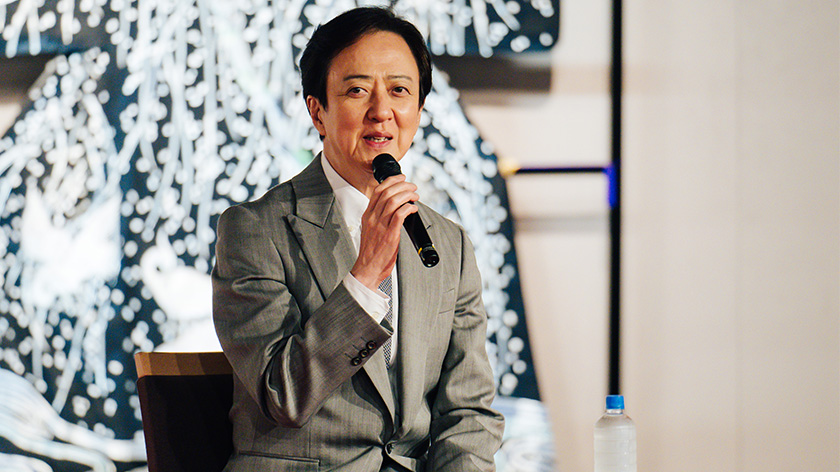
Interview and text
by Sato Rika
Photographs
by Ochiai Naoya
The new Time and Japanese Culture Project, an initiative to promote greater appreciation of Japanese culture.
As the first step in this project, we presented a special exhibition: Four Seasons, Nature, and Life – The Passage of Time and the Beauty of Nature, a collection of costumes belonging to the highly esteemed onnagata (female role) kabuki actor Tamasaburo Bando V. This special exhibition was held at the Seiko House Ginza Hall in June 2023.
In this exhibition, we displayed 10 stunning costumes, specially selected by Tamasaburo from among his personal collection. These superb creations express the beautiful scenery of the four seasons, lovingly rendered in rich, colorful patterns by masters of the weaving and dying arts. This report presents the exclusive details of the Special Interview with Tamasaburo Bando, a rare opportunity to limited to 40 people selected by lottery.
Additionally, it highlights the very successful costume exhibition, which attracted throngs of visitors every day.
table of contents
- ・A variety of costumes designed for major roles, carefully curated to reflect both the essence of Time and Japanese culture.
- ・The Passage of Time and the Beauty of Nature as perceived through costumes
- ・Bold designs and fine techniques that captivate the audience on the kabuki stage
- ・Tamasaburo's passion for crafting costumes, working together with artisans
- ・The Q&A session, filled with his unique personal perspectives, rose to a pinnacle of excitement and emotion
- ・As someone who is inheriting an important aspect of Japanese culture, I want to inherit it just the way that I feel it.
A variety of costumes designed for major roles, carefully curated to reflect both the essence of Time and Japanese culture.
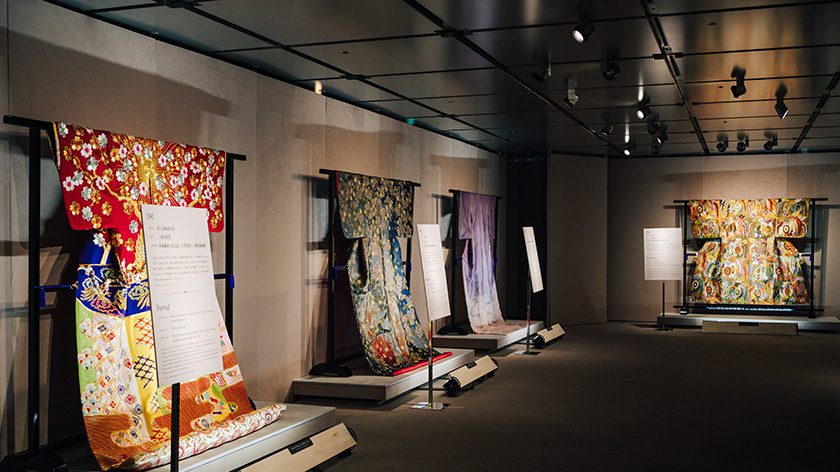
The programs, list of roles, and plot synopses were displayed along with the costumes.
Photographs by Ochiai Naoya
The exhibition showcased 10 stunning costumes specially selected from the personal collection of Tamasaburo Bando. The selection focused on the theme of Four Seasons, Nature, and Life – The Passage of Time and the Beauty of Nature.
The display of gorgeous costumes began with a red crepe outer robe (uchikake) evoking the feeling of a spring court, then transitioned into a cool summer robe, and a karaori adorned with vibrant autumn leaves on a gold background.
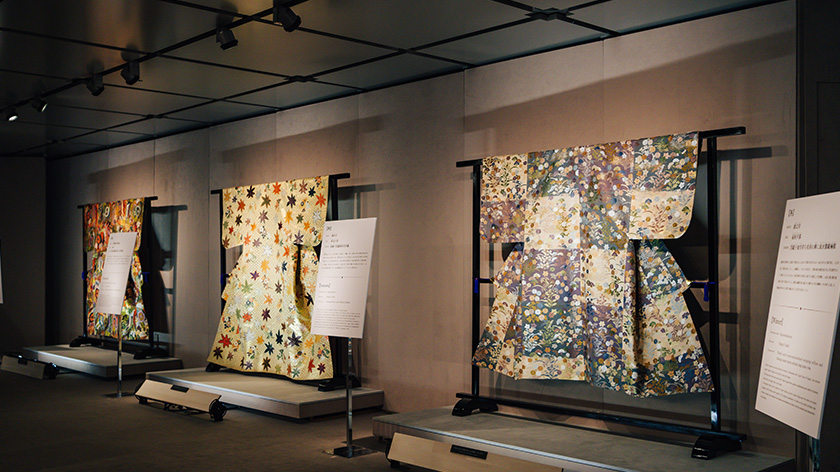
The path through these costumes followed the flow of the seasons.
Photographs by Ochiai Naoya
Tamasaburo suggested arranging the costumes in the order of spring, summer, fall, and winter, clockwise from the entrance. This arrangement allows visitors to experience the changes of the four seasons, which are so important to the Japanese, even today. The costume exhibition offered a one-of-a-kind opportunity for visitors to appreciate the intricate details of these kabuki costumes and rediscover the pageantry of the plays.
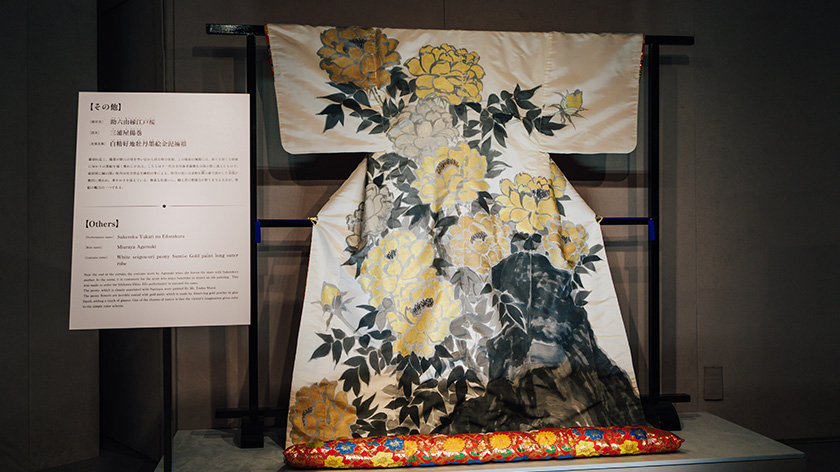
White Seigou-ori (peony) sumi-e gold-painted long outer robe
Photographs by Ochiai Naoya
Among the items on display was an outer robe worn by Agemaki, a high-ranking Yoshiwara courtesan in the play Sukeroku Yuren Edozakura*. Additionally, there was an outer robe worn by Yuukun Akoya from Dannoura Kabuto Gunki, who performs on stage playing the koto, shamisen, and kokyu.
*Note: The name of the play varies depending on the actor portraying Sukeroku.
This was a rare opportunity to be able to see the intricate costumes of a tateoyama, the highest level of onnagata (female role) kabuki actor, up close. Many visitors were breathless being only inches away from the exquisite beauty before them.
The Passage of Time and the Beauty of Nature as perceived through costumes
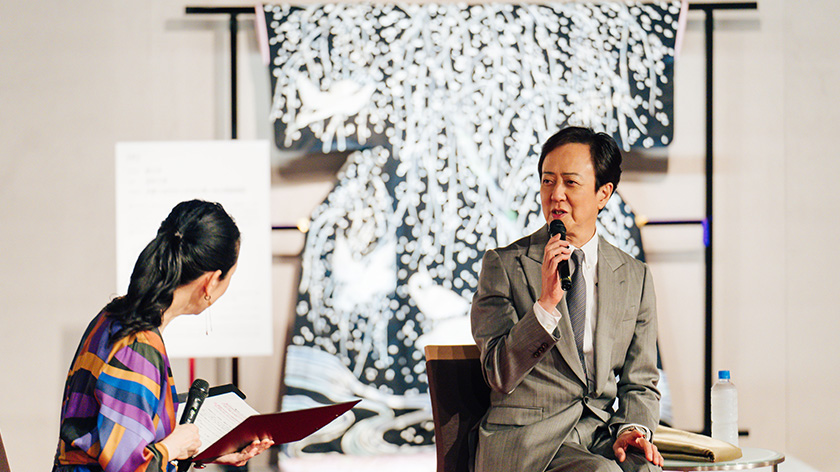
The live, onstage interview began with the theme of The Passage of Time.
Photographs by Ochiai Naoya
Throughout the show, Tamasaburo, who had been involved in the production of these costumes, shared personal insights into their design, details of the production process, and his personal reflections while wearing each of them.
Someone asked Tamasaburo, "When are you most aware of the beauty of Nature and Time?" In response, he talked about the difficulty of storing kimono and other delicate objects with just the right humidity. Rather than use a mechanical system, he chose to store these garments in paulownia wood boxes. During the hot, humid months, the paulownia expands to prevent moisture from entering, and in the dry winter months, it allows just the right amount of humidity to maintain optimal conditions. This, he said, shows both the beauty of Nature and the constant flow of Time.
He also recounted an episode from his youth when he cherished walking through a bamboo grove in the rain, stating, "I sometimes feel that the beauty of the natural world and Japanese culture in particular are both sustained by water."
He continued, "When we explore this exhibition, we can experience the distinctive qualities of Japanese life, such as utilizing motifs of autumn plants and trees in kimono patterns as a way to feel cooler during the hot, humid summer, and enjoying the anticipation of spring while still finding joy in a beautiful snowfall during the cold winter.” Tamasaburo, who is quite familiar with foreign cultures, suggested that by learning about the lifestyles of other countries, including those with hot climates where rain is scarce, we can rediscover some of the appeal of Japanese culture.
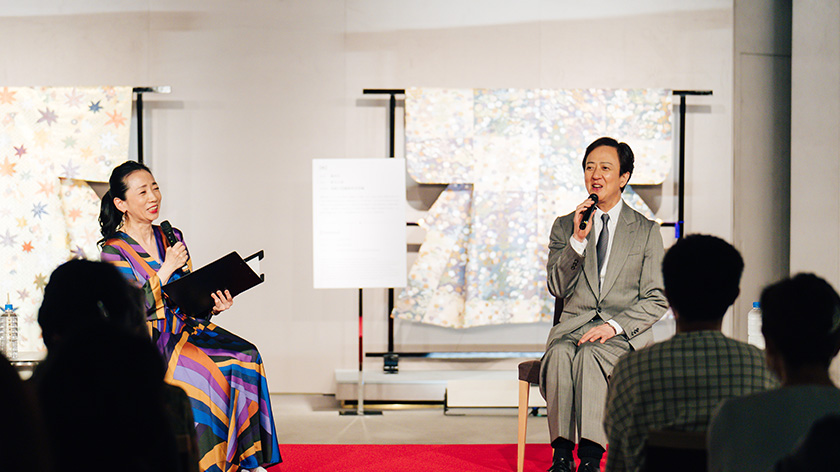
Tamasaburo's words produced appreciative nods among the assembled crowd.
Photographs by Ochiai Naoya
When he was informed about the success of the costume exhibition, he remarked, "I have never had the opportunity to see my costumes displayed side by side like this before, so seeing them here, I must admit they look even more magnificent than I had imagined." It was an impressive moment that left Tamasaburo's words hanging in the air and filled the room with silence.
Bold designs and fine techniques that captivate the audience on the kabuki stage
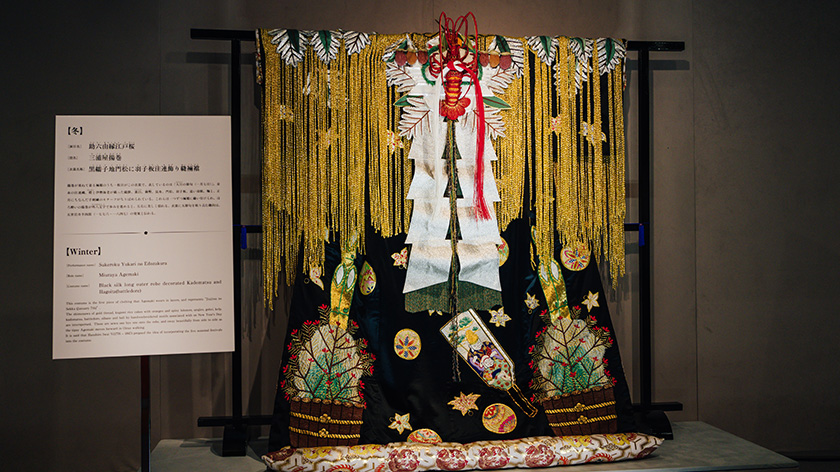
A garment design known as “Black satin weeping willow and flowing water heron-stitched long outer robe”
Photographs by Ochiai Naoya
When Tamasaburo was asked, "Of all the costumes you have, which one do you consider the finest?" he unhesitatingly selected the outer garment of the multi-layered robe worn by the courtesan Agemaki in the play Sukeroku.
Tamasaburo commented, ”I’ve heard that among the costumes exhibited, the one with the lobster (ise-ebi) on the back has attracted considerable attention. The notion of wearing a lobster or a round rice cake, known as kagami-mochi, on the back of one's costume is both bold and intriguing. The technique of capturing the audience's attention and immersing them in the narrative is a distinct characteristic of kabuki."
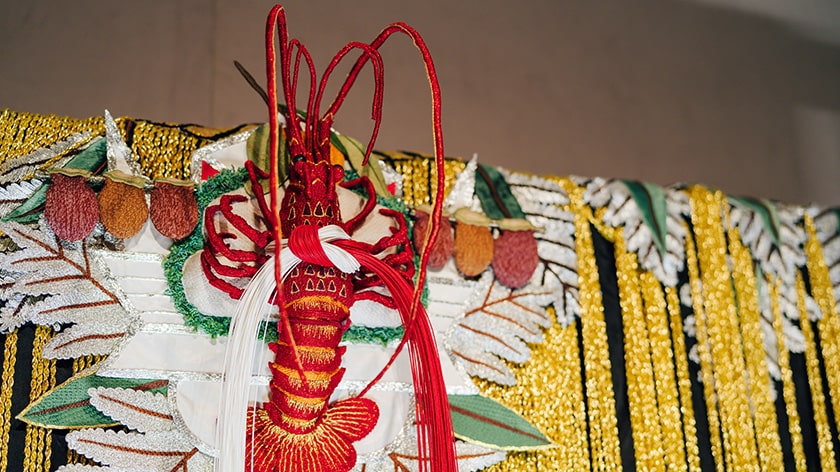
Hand-embroidered motifs traditionally associated with the New Year, such as kurogaki (persimmon), kombu (kelp), and hagoita (a kind of wooden paddle), are interspersed throughout the design.
Photographs by Ochiai Naoya
He also mentioned that during the performance, after he has donned all the other costumes, the one with the lobster decoration comes at the very end: "The lobster costume is truly magnificent, but once I step on stage, it must be removed while the audience's attention is still focused on the hanamichi [a long, raised platform that extends from the stage out into the audience].” He continued, "While playing this role, I have encountered Ebizo-san [another famous actor, now known as Danjuro Ichikawa], but I have never come across this lobster." This elicited a ripple of laughter from everyone present.
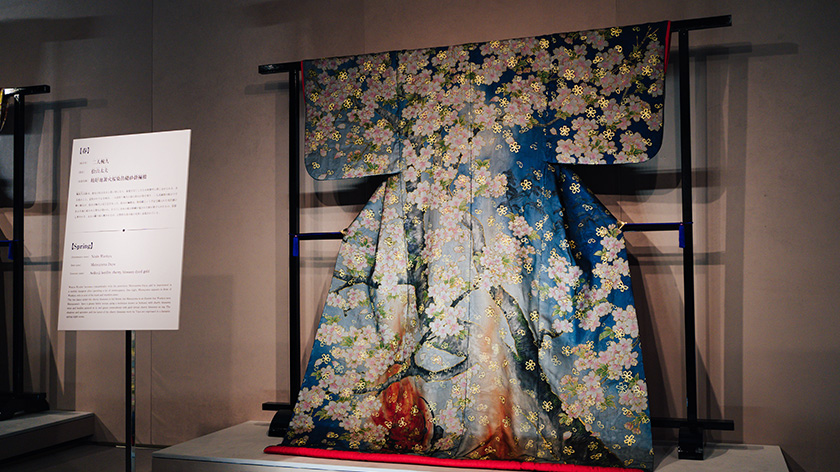
Seiko-ji bonfire cherry blossom dyed gold
Photographs by Ochiai Naoya
In contrast to the grandeur of the outer robe worn by Agemaki, the outer robe of Matsuyama Dayu, who appears as a phantom in Ninin Wankyu, exudes an ineffable charm. The pattern, which depicts the shadowy splendor of cherry blossoms at night, was painstakingly designed, allowing the red flame of a bonfire to be visible at the wearer's feet.
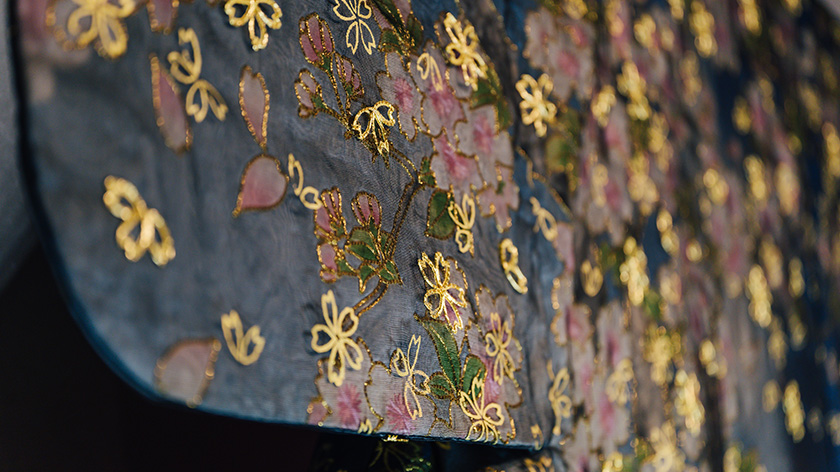
A sheer silk fabric adorned with gold thread embroidery over material woven with the Seigo-ori technique.
Photographs by Ochiai Naoya
Tamasaburo explained: “At first, I had not planned to use sheer silk, but when I examined the material during the weaving process, the navy and white hues appeared too strong and too prominent, which did not suggest the ethereal beauty of Matsuyama. Pressed for time, I decided to use a black silk adorned with cherry blossoms and gold thread. Fortunately, that combination perfectly revealed her indescribable beauty, making it seem to constantly appear and disappear before our eyes.”
Tamasaburo's passion for crafting costumes, working together with artisans
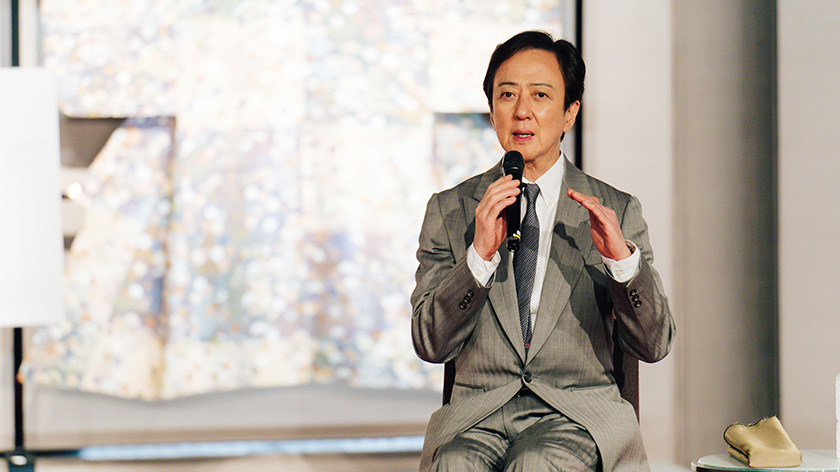
Tamasaburo reflects on the costume-making process
Photographs by Ochiai Naoya
Tamasaburo emphasizes the importance of personally meeting with the various dyers, weavers, and other artisans during the costume creation process.
"These artisans rarely have a chance to meet the actor who will wear the costume, but when they do, the artisans are inspired and further imbue their work with the emotions this meeting has stirred," he explained. "Even if they do not exchange words, it is crucial for the artisans to be aware of the type of actor who will ultimately wear the costume.”
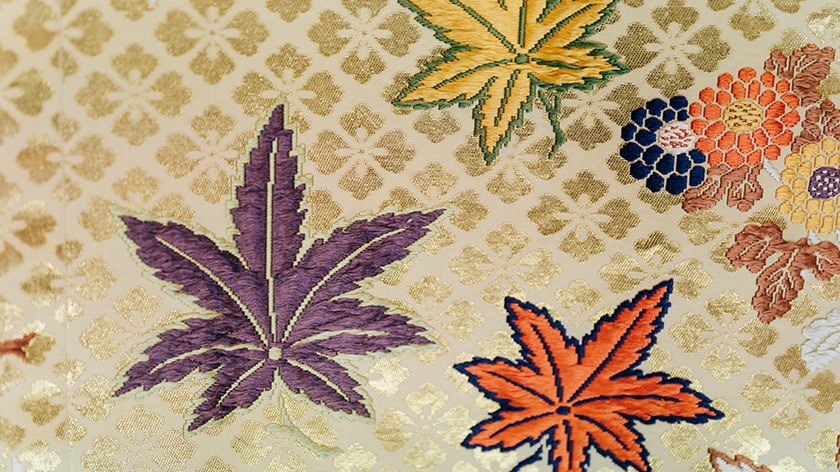
Ukonji-ori Hanabishi woven with Momiji Karaori
Photographs by Ochiai Naoya
Some of the costumes were meticulously crafted through extensive consultations between Tamasaburo and a particular weaver.
“Long ago, I was a little concerned about how the colors would appear in the material, so I requested a weaver to create a test sleeve for me to check. When I shared my concerns about color combinations, he responded, ‘Subdued colors work well for the Noh theater, whereas vibrant colors are more appealing on the kabuki stage.’ I chose to place my trust in his expertise and left the matter in his hands. During the performance, the costume was vibrant and the patterns were nothing less than stunning, precisely as the weaver had foretold.”
The Q&A session, filled with his unique personal perspectives, rose to a pinnacle of excitement and emotion
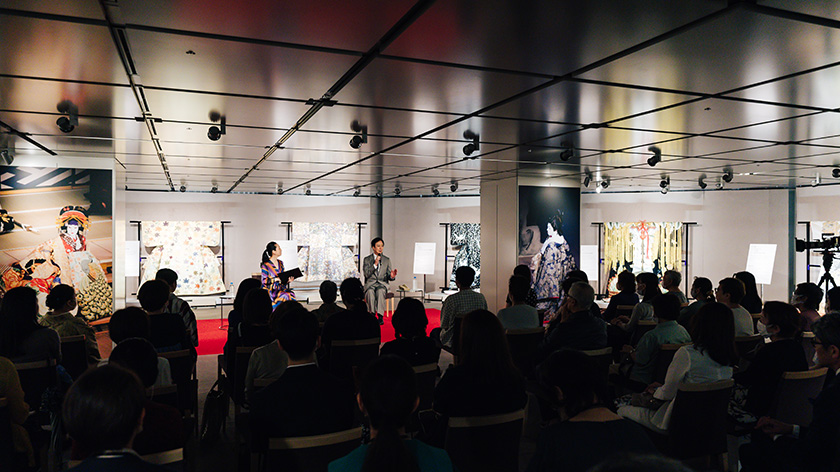
A photo of Tamasaburo onstage in full costume was displayed on a pillar in the hall.
Photographs by Ochiai Naoya
At the conclusion of the interview, he was asked, "As a kabuki actor, how do you perceive the passage of time and the sense of change?" He replied, "It's interesting how time on the stage is different from real time. On stage, something that happens quickly might be shown in just a few minutes, while a character’s entire lifetime could be expressed in an hour." To Tamasaburo, this is part of kabuki's allure.
"When the performers’ art allows one to rise above the bonds of time and space, the audience is likewise freed from normal constraints of temporal and spatial dimensions. Costumes are a key part of this bending of space-time that is an essential part of kabuki. What the actors wear is not merely clothing, but a transformational material that becomes part of their being and shapes both their dialogue and their movements. Costumes help performers to internalize and manipulate time and space, and then to offer this unique experience to the audience as well. That is kabuki!”
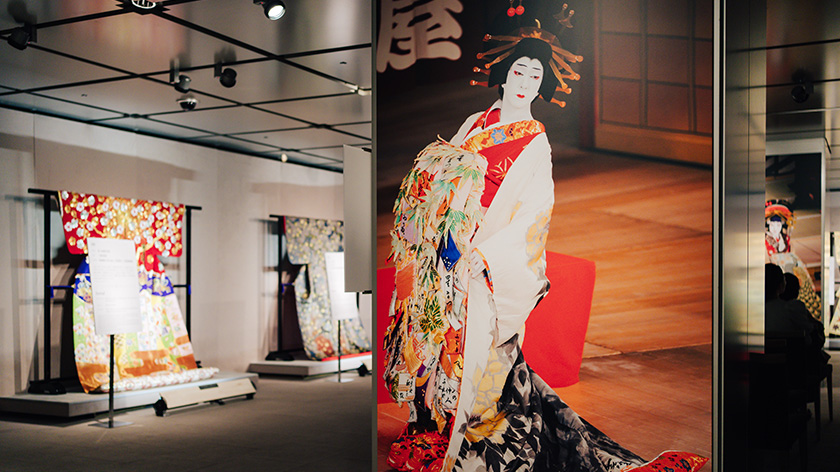
The long, multi-layered robe that Agemaki wears is one of the notable highlights of the play Sukeroku
Photographs by Ochiai Naoya
At the end of the event, everyone in the audience raised their hands to ask questions. Having a Q&A session with an outstanding kabuki actor is extremely rare, yet Tamasaburo seemed happy to answer every question on the spot.
When asked, “Do you ever feel as though you are inhabiting another person when you portray a character?” Tamasaburo thought for a moment and then responded, “When I'm performing a character from the long-ago Edo period, sometimes I feel a strange connection with the character's essence, especially when I look at ukiyo-e paintings from that period. There are times when I’m inexplicably moved by some art form or intuitively think that I like this or don’t like that. This unconscious reaction may come from my soul being connected to someone in the past, someone whom I am not even consciously aware of.”
The hour-long event drew to a close even while the audience was still enthusiastically peppering the actor with questions, such as, "What are your thoughts on your career as an actor so far?" and "What is the secret to wearing costumes so beautifully?"
Finally, Tamasaburo looked at everyone and expressed his innermost feelings: “Arranging the costumes in this way, I sense the passage of time. I can’t help but think that we have thirty years’ of costumes right here. It brings me great joy to see so many of the designs that I've created slowly and patiently, completing just one or two each year, all gathered together in one place. And it's really heartwarming to be able to connect with the thoughts and feelings of the artisans as well. Thank you all so much for coming to view this exhibition.”
The audience responded with resounding applause.
As someone who is inheriting an important aspect of Japanese culture, I want to inherit it just the way that I feel it.
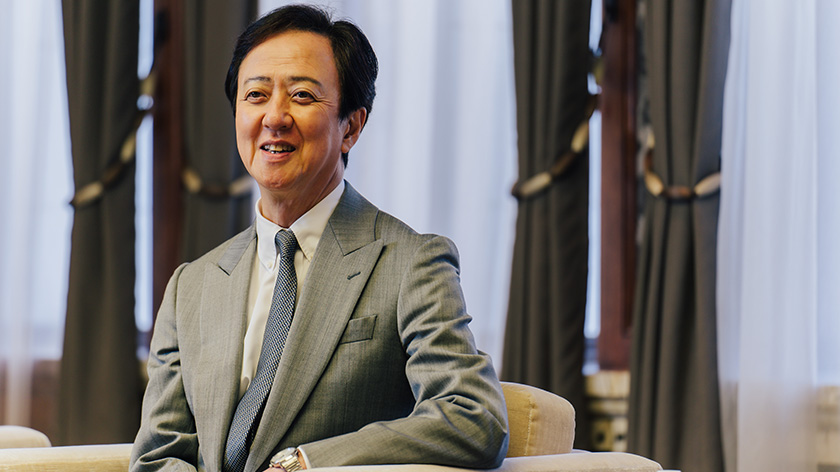
Tamasaburo smiled during the interview.
Photographs by Ochiai Naoya
After exchanging various stories about costumes, he unexpectedly shared his thoughts on inheriting important traditions of Japanese culture as a kabuki actor.
Q:What do you believe is crucial for carrying kabuki forward to the next generation?
TB: I am often asked, "What do you focus on in order to pass on traditions to the next generation?" Even if I have the desire to pass on certain traditions, I never know whether or not I will be able to do so. I think the essence of kabuki and of Japanese culture, for that matter, are ineffable. They cannot be accurately conveyed in words. I try not to impose my ideas on others, but rather, aim for the other person to naturally absorb what I have to teach. The same can be said for my performance in front of an audience.
Q: What aspects of kabuki would you like the audience to focus on?
TB: Whether you are Japanese or foreign, the experience of watching kabuki varies for each individual. Kabuki performances incorporate seasonal elements throughout, from the music and dialogue to the costumes, backgrounds, and props. Therefore, it's ideal if you can simply enjoy the performance based on your own perceptions. Also, I believe that certain aspects cannot be conveyed on film, but only by seeing kabuki performed live in front of an audience, allowing the spirits of both the audience and the performers to interact. My wish is for everyone who attends the show to have a memorable experience.
Q:Reflecting on the costume exhibition, how do you feel at this moment?
TB: Having never had the chance to see my own costumes gathered together before, organizing this exhibition as a part of the Time and Japanese Culture Project has been a moving experience for me.
Although this time we focused on costumes, there are many other items I wish people could observe up close, such as the fans and wigs used in kabuki. One such item is a Seiko automatic watch that the chairman of Shochiku Co. gave me when I assumed the name Tamasaburo at age 14. I had it serviced once, but it’s still running smoothly some 60 years later. This watch holds deep sentimental value, and I would be delighted to show it to the public at the Seiko House Ginza Hall.
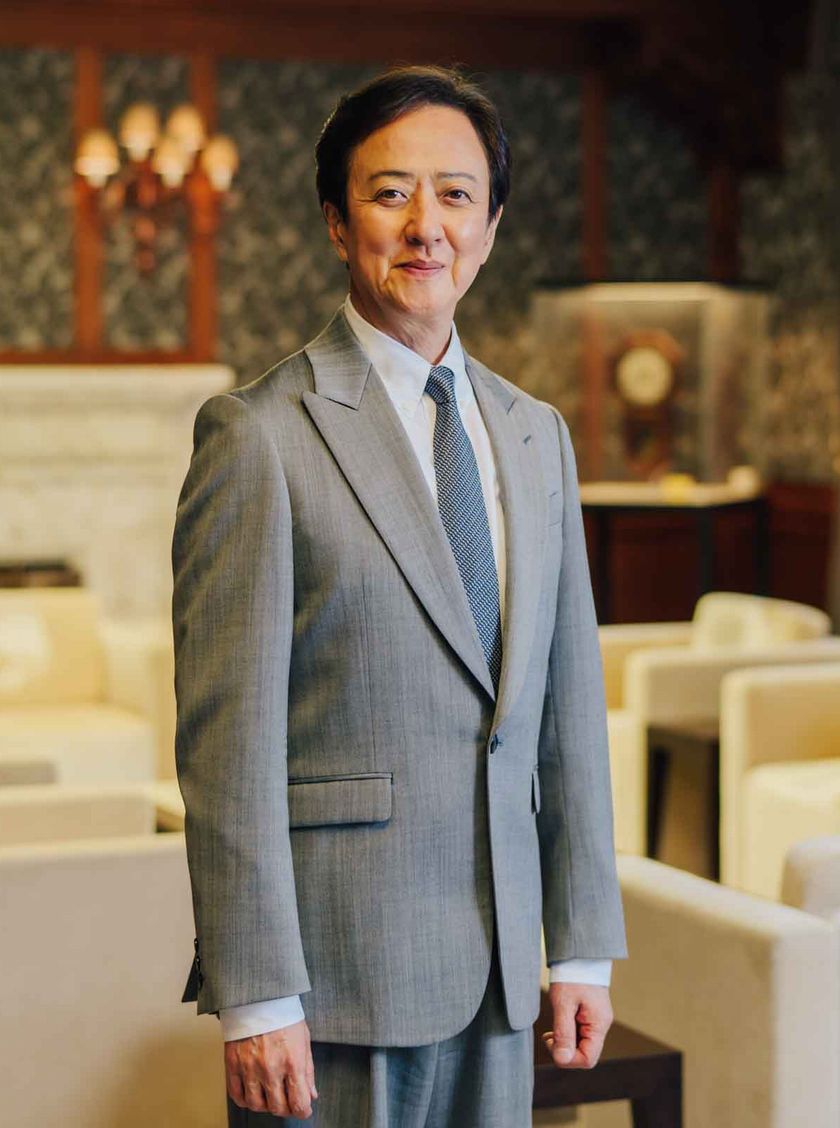
Kabuki actor
Tamasaburo Bando
In December 1957, Tamasaburo Bando V made his professional debut under the name Kinoji Bando in the production Terakoya at the Toyoko Hall. He became successor to the kabuki legacy name Tamasaburo Bando in 1964. He has produced countless critically acclaimed plays, including the masterpiece Tenshu Monogatari (Tale of a Castle Keep). In September 2012, he became the fifth kabuki onnagata (female role actor) to be certified as an Important Intangible Cultural Asset (popularly known as a Living National Treasure). In 2013, he was awarded the "Commandeur" of the Ordre des Arts et des Lettres (French Order of Arts and Culture).






